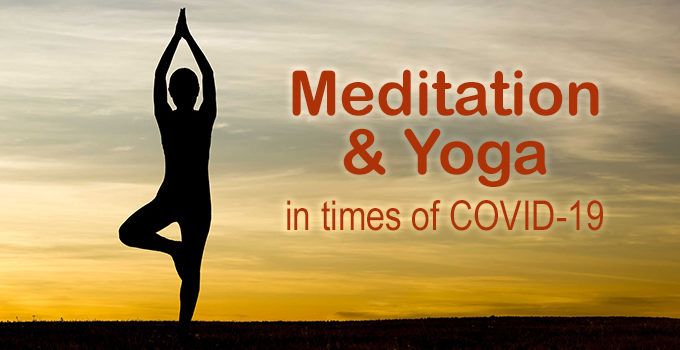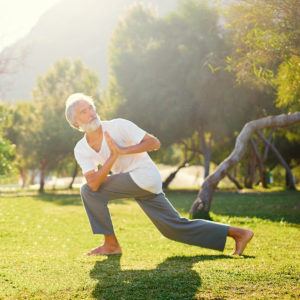

Meditation and Yoga Practices as Adjunctive Therapies for COVID-19
by Sarah McEwen, PhD
Thought leaders and experts from MIT, Harvard, UC San Diego, and even Deepak Chopra himself recently collaborated together on a timely review article to highlight the rationale and urgent need to explore alternative and complementary therapies for combating COVID-19.
This compelling narrative review concludes “certain meditation, yoga asana (postures), and pranayama (breathing) practices (…that…) may possibly be effective adjunctive means for treating and/or prevention of SARS-CoV-2 infection.”
The primary driver behind COVID-19 morbidity and mortality has been found to be an extended runaway hyperinflammatory host response to the virus, which spreads through the body causing extensive tissue destruction and eventually leads to acute respiratory distress syndrome.
Research into the potential anti-inflammatory, anti-stress, and anti-infectious properties of meditation and yoga practices, has been a hot area of behavioral health research for decades, but has become more important to turn to during the pandemic to seek novel preventative measures and treatments.
Anti-Inflammatory Effects of Complementary Practices
A discovery in the early 2000s was that inflammation could be brought under control through stimulation of the vagal nerve complex, a major component of the central and peripheral nervous system. This structure also controls responses to psychosocial stress, and its stimulation can reverse the ‘‘fight or flight’’ response through replacing it with the ‘‘relaxation response.”
Studies have shown that meditation, as well as yoga is capable of increasing vagal tone. In addition to targeting the central vagal tone response, circulating levels of pro-inflammatory cytokines are influenced by different types of complementary practice. Some of the cytokine- related effects of seated meditation, breathing practices, and yoga asana practices are related to a reduction in sympathetic nervous system activation.
Daily Mindfulness and Yoga

One study found that 6 weeks of 20 minutes of daily mindfulness meditation resulted in a significant downregulation of a proinflammatory gene and a significant reduction of proinflammatory activity.
Furthermore, effects on the innate immune system have been found in complementary practices. This was demonstrated in a study showing that 90 minutes of yogic asana stretching is able to increase expression of the two important antimicrobial peptides– core protein molecules in the innate immune system– which are of importance to COVID-19 as they are highly expressed in respiratory cells.
Yoga therapy has also been shown to downregulate the cytokine receptors and mantra-
based meditation and yoga asana practices were found to have positive effects. They regulate
levels of the proinflammatory cytokine and metabolism of the Alzheimer’s disease-associated
amyloid-b protein. Meditation practice also is reported to reduce expression of pro-inflammatory genes.
The Novel Role of Melatonin in COVID-19 Treatment
A novel substance proposed as a possible treatment for COVID-19 is melatonin. The physiological impact of melatonin includes an impressive array of anti-inflammatory, anti-viral, antioxidant, anti-infectious, and immune-enhancing actions on most of the cells and organs of the body.
At the cellular level melatonin works on the mitochondria and nucleus of cells, to aid in DNA repair. The mechanism by which complementary practices can mitigate the disease are through elevations in melatoninin. Studies have reported that although during the practice of seated meditation and pranyma yoga melatonin decreases, longer term practice leads to significantly increased levels. The apparent association with enhanced melatonin activity also implies another pathway by which the beneficial properties of these modalities may be effective, especially with respect to aspects of viral challenges of various forms.
Complementary Practices to Stave Off the Long-Term Psychosocial Effects of the Pandemic
Relevant to the COVID-19 pandemic are the documented effects of some complementary practices, even potentially for novice practitioners, on reducing the severity of symptoms related to stress. Some of the most potent stressors from the perspective of the immune system are those that involve social threat—social rejection or feeling socially isolated, which I know is an issue for many of us as we are confined at home during COVID-19.
With social distancing ordinances now extending into their fifth month, it is this longer-term potential experience of loneliness that may lead to a decline in the immune response. Furthermore, the emerging stress landscape of the COVID-19 pandemic is extreme, with the very fabric of our daily lives being disrupted and even obliterated at multiple personal, economic and social levels.
These kinds of extreme chronic stressors are capable of leading to an overwhelmed immune system, compromising the ability to mount an effective immune response to infectious challenge and leaving the individual becoming susceptible to disease.
To mitigate these COVID-19 related extreme stressors it’s important to look at the extensive psychological effects of a variety of meditation techniques. Indicators that show promising findings in diverse populations include depressed mood, anxiety, and quality of life.
Aftereffects of COVID-19 Stressors
The authors note the likely and lingering aftereffects of the pandemic including inflammatory load in individuals and populations. This could lead to chronic elevated levels of inflammatory substances in the blood and tissues due to lingering subclinical levels of infectious pathogens, bacterial, viral, and otherwise.
According to this body of research, the persistence of pathogens in environments contributes to increased risk and occurrence of most chronic diseases through transmission of subclinical infection, including cardiovascular, neurodegenerative, and other major forms of chronic inflammation-based diseases. This further highlights the positive role of meditative and yoga practices as preventative means of developing chronic medical conditions down the line.
Of interest is the staving off this cascading elevation in inflammation earlier in life which is critical particularly in women of child-bearing years. The rationale is that this stress-related inflammation doesn’t carry over to future generations (as was the case in the offspring of mothers from the 1918 influenza pandemic).
Enhancing immune system functioning has been a well-known benefit of meditation but clearly there are other biological and psychological benefits as well. In the context of the novel COVID-19 disease, with no known cure or pathogenesis, it seems even more imperative we look to multi-faceted, low-cost, low side effect complementary treatments that work on multiple psychological, emotional, epigenetic, neural, and behavioral processes to prevent and potentially modify this elusive disease.
For further reading see Pacific Brain Health Center’s tips for Meditation & Mindfulness for Stress
Reduction for easy-to-implement tips on building these practices into your life.
For more information, or to schedule a consultation at the Pacific Brain Health Center call at 310-582-7641.
About the Author

Sarah McEwen, PhD
Sarah McEwen, PhD, NSCA-CPT, is a Cognitive Psychologist and Senior Research Scientist at the Pacific Brain Health Center. Her specialty is the study of physical activity and cognitive enhancement interventions to investigate biological, behavioral and health-related outcomes in patients suffering from cognitively debilitating disorders.
Last updated: July 31st, 2020